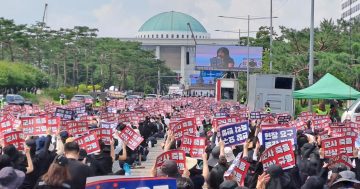 Young South Korean Public Servants are quitting their jobs and heading to the private sector due to frustration over low pay, limited prospects of promotion and a rigid work culture, according to market watchers.
Young South Korean Public Servants are quitting their jobs and heading to the private sector due to frustration over low pay, limited prospects of promotion and a rigid work culture, according to market watchers.
The exodus has accelerated since the Government’s Ministries began to move to Sejong, an administrative city located 112 kilometres south of Seoul.
A woman in her late 20s said the quit her Public Service job because she made just ₩1.8 million ($A2,100) a month unless she worked overtime.
I don’t see the point anymore. I felt stuck,” she said.
Similarly, a Sejong-based Public Servant said he had gone on leave after months of people-facing service at a complaints counter left him drained.
“I thought the Public Service was not that bad a choice, since it has high job security and a pension, but every time I go home from work, I feel like quitting. I will use my leave to look for a new job,” the man said.
According to a 2022 survey by the Korea Institute of Public Administration, more than three out of five Public Servants in their 20s and 30s said they were willing to change jobs if given the chance.
The survey of 6,000 Public Servants was released at the beginning of June and shows that 65.3 per cent of the respondents with work experience of five years or less were prepared to change jobs conditionally, up from 45.2 per cent a year earlier.
The most recent survey showed that young Public Servants had a weaker sense of commitment or value regarding the bureaucracy overall.
Only about a third in their 20s and 30s said they considered their sense of duty to the country and the public as important. This was far lower than the average of 53.2 per cent for the total workforce.
Only 37.5 per cent of those in their 20s and 30s said they were satisfied with their work. Over 65 per cent of them said they were not appreciated by society.
Commenting on the results, the Institute said employee benefits should be strengthened and seniority-based pay should be overhauled.
“Workers should be paid based on their performance and productivity,” the Institute said.
Seoul, 25 June 2023












